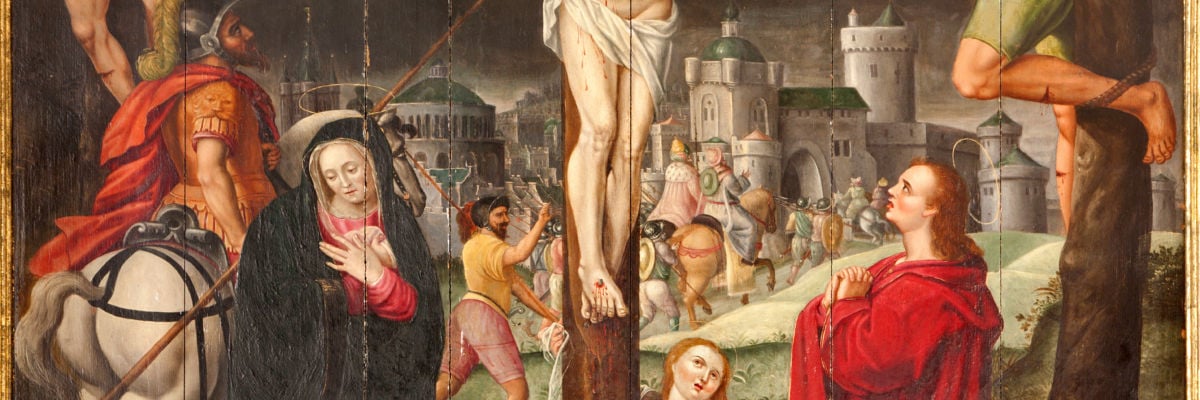
Tim Staples delves into the Catholic perspective on salvation, addressing the common misconception of “faith alone.” He clarifies the role of grace, faith, and good works in the Christian life, while emphasizing the importance of the seven sacraments as channels of God’s grace. Tim weaves Scripture and Catholic teaching to provide a clear and compelling explanation of this fundamental doctrine.
Transcript:
I was curious why in the Catholic faith they hold to the seven, I guess, the seven sacraments, like the requirements to salvation, because in a Christian standpoint, I know we hold to just grace through faith and obviously have works that is a fruit of your faith. But just curious where or why they hold so strong to that.
Yeah, great question, Joshua.
The key is understanding first that, and you mentioned, you didn’t quote the verse, but you alluded to Ephesians 2, verses 8 and 9, “For by grace you have been saved through faith,” and that not of yourselves, it’s a gift of God, not of works lest anyone should boast. The Catholic Church teaches that, that our salvation is first of all by grace. In fact, there’s a sense in which we can say as Catholics, by grace alone, in fact, through faith and our obedience and good works and all of the sacraments, but of course it’s only by, through, and in the power of God’s grace merited for us on the cross by Jesus Christ. But see, the key is this, though, of course both faith and grace do not come from us, and that’s Paul’s point. It’s not of yourselves, it’s a gift of God. And by the way, he’s referring there to both grace and faith, being a gift from God, and we believe that. However, Jesus is the one who tells us how he distributes that unmerited favor that we call grace, right? He distributes that grace, and seven of the principal ways that he communicates that grace to us. Not taking away, because of course it’s Jesus who established those seven sacraments. And by the way, we don’t all have to receive all of those sacraments because sacraments, for example, of holy orders, that means ordination, or holy matrimony, which means marriage is not for everyone. So it depends, not everyone gets married, not everyone is an ordained priest. So they are necessary for salvation, but in accordance with our particular calling in life. But Joshua, here’s the key. So we understand that Jesus merited our salvation. He is, as 1 John chapter 2, verses 1 and 2, he is the perpetuation for our sins, not only our sins, but the sins of the whole world. He merited infinitely, right? So all of the grace that we receive comes through Jesus Christ and Him alone.
Mary can’t merit grace on her own. Cy Kellett can’t merit. No one can merit grace. However, once we enter into grace, that’s when we can begin to merit rewards from God. That’s the Catholic position, and that’s what we see all over the New Testament. I’ll just mention, for example, Galatians 6, verses 7 through 9, “Be not deceived, God is not mocked whatsoever man sows. That shall he reap.” “If a man continues to sow to the flesh, he shall of the flesh reap death. If he continues to sow to the spirit, he shall of or from the spirit reap everlasting life. Therefore, let us not grow weary in well-doing, because we know we will reap the reward,” what reward? Eternal life, “if we faint not.” Okay, but the key is, how do we get this grace into our lives, right? And of course, faith is essential, but not faith alone, my friend, at least in the way that Luther taught faith alone. He went wrong, and why is that? Because yes, faith is necessary, as Hebrews 11 says, Hebrews 11, verse 6, “Because without faith it’s impossible to please God.”
But notice, in Mark 16, 16, now we’re going to talk sacraments here, just for a minute, Joshua.
In Mark 16, 16, Jesus says, “He that believes and is baptized shall be saved.” That’s one of the reasons why we believe faith alone is not enough if you’re going to say faith alone apart from baptism. No, because Jesus says that it’s faith and baptism that leads to salvation. In 1 Peter 3, 21, St. Peter tells us, “Baptism does now save us.” Now, by the way, that doesn’t mean baptism alone, because we also need faith. John 3, 16, I hope you’re following me on this, Joshua. And I guess St. Paul sums it up in Romans 6, 3 when he says, “We are buried together with Him through baptism.” Notice, that’s how we enter into Christ’s death. We’re buried together with Him through baptism just so that just as Christ was raised to nudists of life, we would be raised to nudists of life in Him. So that’s why we see baptism as necessary because that’s the instrument that Jesus established. He’s the one who told the apostles to baptize in places like John 3, 22, John 3, 5, Mark 16, 16, as I said. And through that great gift we enter into Christ and we experience new life. However, there’s a second sacrament called, we call it confirmation, that Jesus also promised to give. Remember, in John 16, 13, the apostles who had already come to faith, they already believed. In fact, Jesus said in John 15, 3, a whole chapter before, He said, “You are already clean,” He says to the apostles, “because you’ve received My word.” And yet, He tells them in John 16, 13, “Don’t go anywhere,” right? He says, “Wait for the promise of the power of God.” He says, “I am going to sin the Holy Spirit who will lead you into all truth.” In fact, I was referencing two texts there, John 16, 13 and Acts 1, verses 6 through 8, especially verse 6, where He says, “Tarry in Jerusalem, don’t go anywhere, and wait for the promise of the Father.” And what is that promise? The gift of the Holy Spirit who will lead you, John 16, 13, lead you into all truth.
And through the Holy Spirit we receive power. Skip down to Acts 1, verse 8, “You shall receive power, dunamis, after that the Holy Spirit has come upon you.” So that is the sacrament of confirmation, which takes the power of the Holy Spirit we already have in baptism and increases it and empowers us to be able to live. And that’s what we see in Acts chapter 1 leading up to chapter 2, verse 4, of course, at Pentecost where the apostles, the flames of fire come upon 120 people’s heads and they transform the world. That’s the sacrament of confirmation. But notice that’s power. That’s the power of the Holy Spirit. That’s sanctifying grace. That’s an increase in the grace that we’ve already received through baptism. And then we could go to the third sacrament, which is the Eucharist. Now unfortunately I’m not going to be able to go through all seven because we’ll take the whole show here. But maybe, Joshua, if you want to be a guest on my podcast we’ll go through all seven in detail. But the Eucharist, of course, is the source and summit of our faith as Catholic Christians. This is the sacrament Jesus taught us about in John 6.53. In fact, the whole chapter of John 6 where he said, “Unless you eat the flesh, the Son of Man, and drink His blood, you have no life in you.” This is the sacrament that St. Paul talks about in 1 Corinthians chapter 10, verse 15, where he says, “The cup which we bless.” He’s referring to communion, Joshua. He says, “The cup which we bless, is it not the partaking in the blood of Christ?” That is a very plain reference to the Eucharist.
That’s the term we use for communion, eucharist, which means to give thanks. Because Jesus, when He instituted the Eucharist, He started with giving thanks, eucharisto in Greek. But Paul says, “And the bread which we bless, is it not a partaking in the body of Christ?” And you see, that’s how, ultimately, we get to heaven, is by the blood of Jesus Christ. As you’ve been taught, I’m sure, Joshua, in your church, right, we’re covered in the blood of Jesus. In fact, 1 John chapter 1, verse 7, St. John says that if we walk in the light as He is in the light, we have fellowship one with another, and the blood of Jesus Christ continues to cleanse us from all unrighteousness. Notice there, John’s talking about an ongoing relationship with Jesus Christ, and the blood continues to cleanse us. See, not just one time when you accept Jesus according to St. John, but you continue. And this is one of the ways we receive the blood of Christ, of course, in the Eucharist. So Joshua, that’s just three out of the seven sacraments that we could talk about. But does that make sense? You see, Joshua, the key is, I’m finding more and more as a Catholic, this thing really is about a personal relationship with Jesus Christ, and the sacraments are all about Jesus Himself empowering us to have that personal relationship.
Hey, thanks for watching. If you like this Catholic answer, be sure to like, subscribe, and check out our live streams Monday through Friday, 3 to 5 p.m. Pacific, or find the episode after on YouTube, your favorite podcast platform, or our Catholic Answers app.



